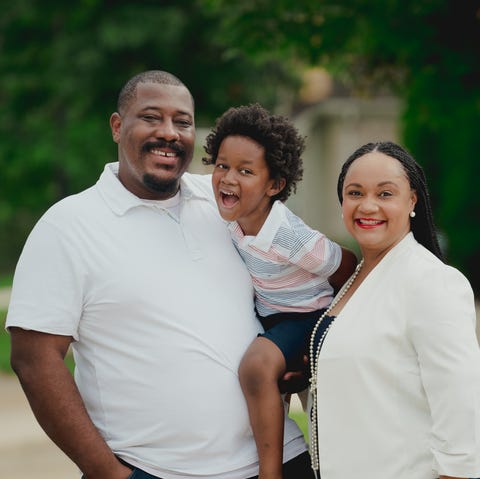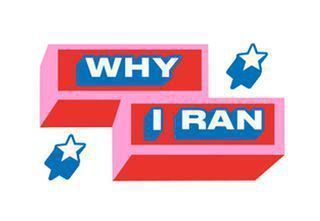Historically, women have needed to be convinced to enter politics. But since the 2016 presidential election, thousands of women announced their plans to run for public office. And we want them
Nikema Williams is no stranger to Georgia politics. In 2017, after years working for Planned Parenthood, she won a seat in the state Senate during a special election. In 2019, she became the first Black woman to chair the state's Democratic Party. But when civil rights icon and longtime congressman John Lewis passed away this July, Williams stepped into a new kind of leadership. Following state law, she quickly applied for Lewis' seat and was voted to replace him on the ballot this November, essentially securing her place in Congress representing Georgia's 5th district.
Williams officially launched her campaign on August 6th, the anniversary of the Voting Rights Act, a landmark piece of legislation for which Lewis risked his life. "I wanted to make sure we were grounding ourselves in why I was running and why we're doing this work," she told ELLE.com. Below, she explains why she first decided to run for office and how she's finding her own place in history.
I'm from the Deep South in Alabama and grew up a little girl in a home with no indoor plumbing and no running water. For me to become a member of Congress—that’s the story of Atlanta. I moved here not knowing a soul because Atlanta was a place where Black women, where Black people came to grow and prosper. Now I get to be the voice of my district.
Growing up, I was raised by my grandparents. I knew they worked at the polls as Election Day workers. My grandpa would have slate cards that we would pass out so people knew who to vote for. I didn't quite understand the magnitude of it, but it was definitely instilled in me that voting was an important act, that this is something that we all did and was necessary.
In high school, my government and economics teacher took me to D.C. for a trip. I was able to sit in on congressional hearings and meet my member of Congress. We even sat in on a Supreme Court hearing. That was my first time on an airplane, first time traveling without my family, first time in Washington D.C. That peaked my curiosity even more.
By the time I ran for office, I had been involved and engaged in the Democratic Party in some form of leadership for 15 years. I lived in heavily Democratic districts with elected officials that were doing the right thing by me. I'm a firm believer that if people are doing their job, you shouldn't replace them just because you want their job. I had been content with helping other people get elected to office.

Then in 2017, my state senator decided to run for mayor of Atlanta. There was an open seat, and open seats don't come around often in the downtown districts. I knew that it was something I wanted to do someday, and I would regret it if I didn't give it a shot. I had a two-year-old son at the time. I wanted to make sure he had every opportunity in the world, and I didn't want to leave it to chance. Who better to fight for my community and for my child than me?
So I stepped up and said I was going to run. I got tons of pushback. It’s easy for people to box you in as the worker bee, the helper, the person who gets everyone else elected, but not see you as the candidate themselves. I remember asking one of my current colleagues to support me. I had worked on her campaign and looked up to her as one of the most progressive members of the state Senate. She said, "Well, what if you lose? I don't want your first race to be a loss." I thought, "But if you help me, then I won't lose." People thought it wasn't my turn, that I needed to run for a lower office first. But I did it anyway and was successful.
It was late on that Friday night when I got the news Congressman John Lewis passed away. I went in to tell my husband, who had worked for Congressman Lewis for eight years. Congressman Lewis was a national hero and civil rights icon to many, but he was a very personal friend to us. When I was running for state Senate, Congressman Lewis didn't hesitate to endorse me in a contested election with other people he knew in the race. He co-hosted my first campaign fundraiser. After I won, we had a swearing-in at the State Capitol. He was in D.C. but flew in just to be there. That will always hold a special place with me.
View this post on InstagramA post shared by Nikema Williams (@nikemaforcongress) on
It was difficult having to grieve while comforting my grieving husband and looking at the task ahead of us as a party, then making the very personal, life-changing decision to offer myself to be considered for the position. This seat is somewhat sacred to Atlantans. It covers the heart of Atlanta and the metro area, there are major corporations, the busiest airport in the world, the international headquarters of Coca-Cola, The King Center. This is a very special district. I knew that there would be pushback, and I had to prepare myself.
I think I'm still processing it all. I’m trying to understand my place in this moment of American history. I know that I have an obligation to make sure I am living up to Congressman Lewis' legacy. But each generation has an obligation to move the needle one step forward.
For all of the people that want me to slow down, I look at what's happening in my communities. I look at my five-year-old son. I'm raising a little Black boy. It’s up to us to create a better future for him. For far too long, Black women have not been seen as leaders, not just in our party, but in our country. This year, we see a record number of Black women running for Congress—and I am quick to tell people “plus one” because my race just launched. I'm a believer that it's never the wrong time to do the right thing. I always take to heart: If not us, then who? And if not now, then when?
This interview has been edited and condensed for clarity.

